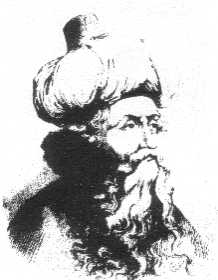
Back Ibn Arabi Afrikaans محيي الدين بن عربي Arabic محيى الدين بن عربى ARZ Ibn Arabi AST İbn əl-Ərəbi Azerbaijani Ибн Ғәрәби Bashkir Ибн Араби Bulgarian ইবনে আরাবী Bengali/Bangla Ibn Arebi BS Ibn al-Arabí Catalan
Ash-Shaykh al-Akbar Muḥyī ad-Dīn Ibn ʿArabī | |
|---|---|
| ابن عربي | |
 | |
| Born | 28 July 1165 |
| Died | 16 November 1240 (aged 75) |
| Era | Medieval philosophy |
| Region | Middle Eastern philosophy |
| School | Founder of Akbariyya |
Main interests | |
| Arabic name | |
| Personal (Ism) | Muḥammad |
| Patronymic (Nasab) | ibn ʿAlī ibn Muḥammad ibn ʿArabī |
| Teknonymic (Kunya) | Abū ʿAbd Allāh |
| Epithet (Laqab) | Ibn ʿArabī |
| Toponymic (Nisba) | al-Ḥātimī aṭ-Ṭāʾī |
| Part of a series on Islam Sufism |
|---|
 |
|
|
Ibn ʿArabī (Arabic: ابن عربي, ALA-LC: Ibn ʻArabī; full name: أبو عبد الله محـمـد بن عربي الطائي الحاتمي, Abū ʻAbd Allāh Muḥammad ibn ʻArabī al-Ṭāʼī al-Ḥātimī; 1165–1240)[1] was an Andalusi Arab scholar, mystic, poet, and philosopher, extremely influential within Islamic thought. Out of the 850 works attributed to him, some 700 are authentic while over 400 are still extant. His cosmological teachings became the dominant worldview in many parts of the Muslim world.[2]
His traditional titular is Muḥyiddīn (Arabic: محيي الدين; The Reviver of Religion).[3][4][5] After he died, and specifically among practitioners of Sufism, he was renowned by the honorific title Shaykh al-Akbar (Arabic: الشيخ الأكبر).[6] This, in turn, was the name from which the "Akbarian" school of Sufism derived its name, making him known as Doctor Maximus (The Greatest Teacher) in medieval Europe.[7] Ibn ʿArabī is considered a saint by some scholars and Muslim communities.[8][9]
Ibn 'Arabi is known for being the first person to explicitly delineate the concept of "Wahdat ul-Wujud" ("Unity of Being"), a monist doctrine which claimed that all things in the universe are manifestations of a singular "reality". Ibn 'Arabi equated this "reality" with the entity he described as "the Absolute Being" ("al-wujud al-mutlaq").
- ^ Cite error: The named reference
:1was invoked but never defined (see the help page). - ^ Ibrahim Kalin, Salim Ayduz The Oxford Encyclopedia of Philosophy, Science, and Technology in Islam, Vol. 1 (Oxford University Press, 2014 ISBN 9780199812578), p. 162
- ^ Nasr, Hossein (1976). Three Muslim sages : Avicenna, Suhrawardī, Ibn ʻArabī. New York: Caravan Books. ISBN 9780882065007.
- ^ Corbin, Henry (2014). Creative Imagination in the Sufism of Ibn Arabi. Princeton University Press. p. 76. ISBN 9781400853670.
- ^ Cite error: The named reference
:2was invoked but never defined (see the help page). - ^ Cite error: The named reference
:3was invoked but never defined (see the help page). - ^ Arabi, Ibn (2020). IBN 'ARABI 》 'Doctor Maximus' & 'The Great Master' SELECTED POEMS (Translation & Introduction by Paul Smith). Independently Published. ISBN 978-10-78-41521-7. Retrieved 28 February 2022.
- ^ Chittick 2007, p. 1.
- ^ Al-Suyuti, Tanbih al-Ghabi fi Tanzih Ibn ‘Arabi (p. 17-21)